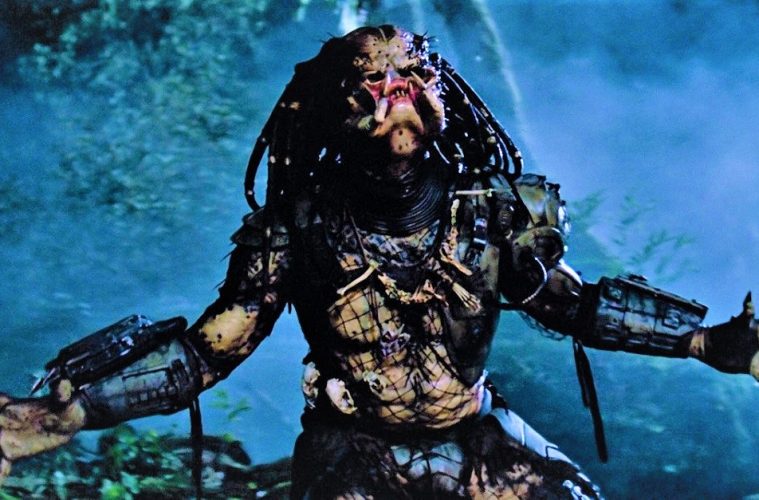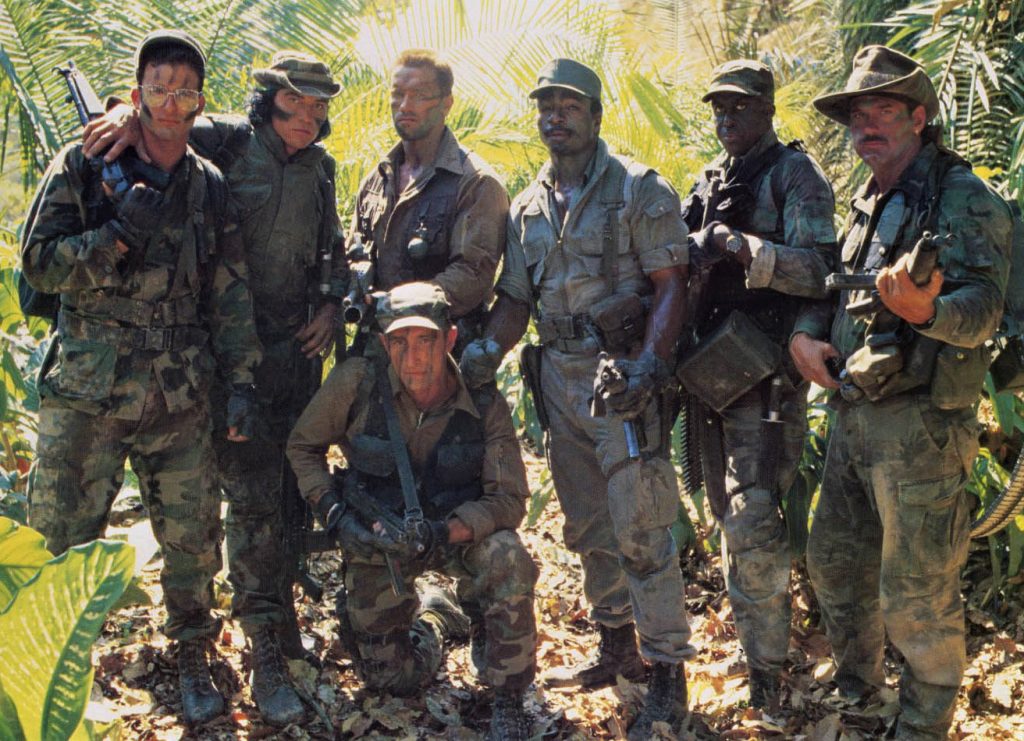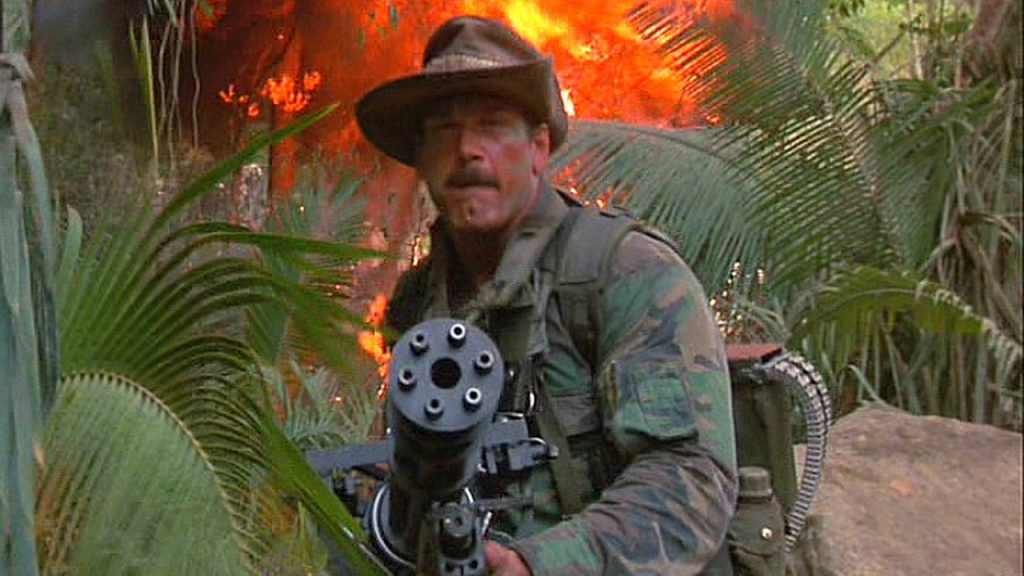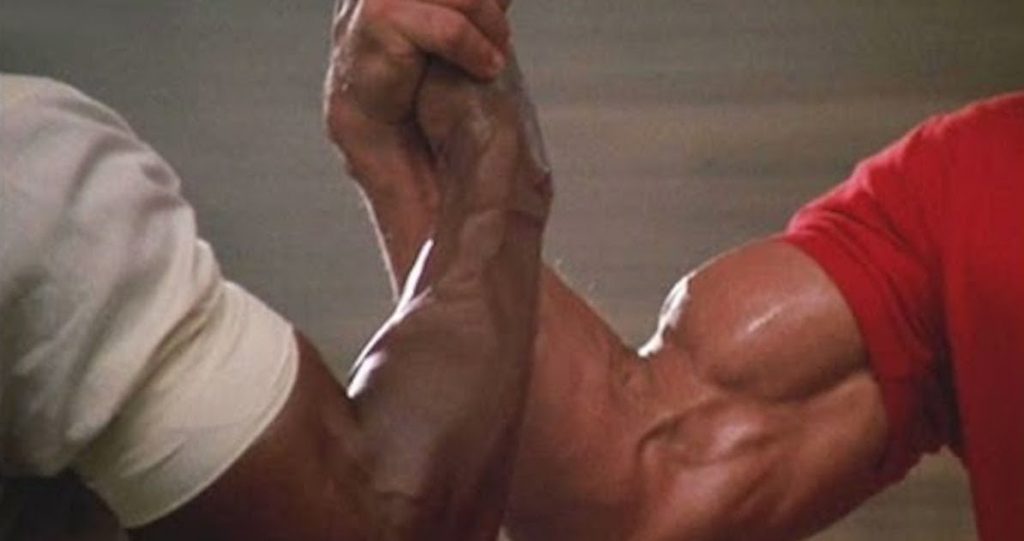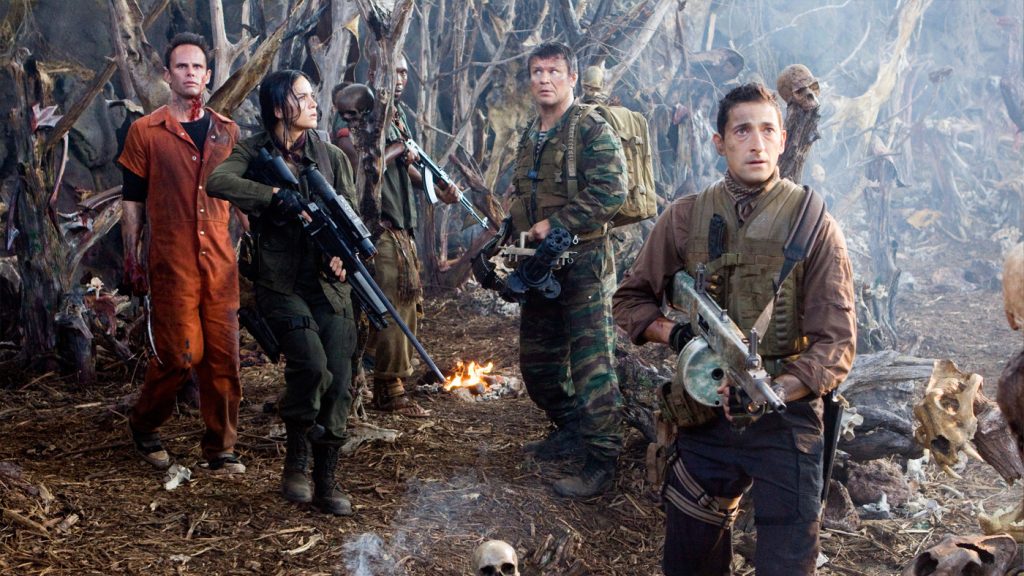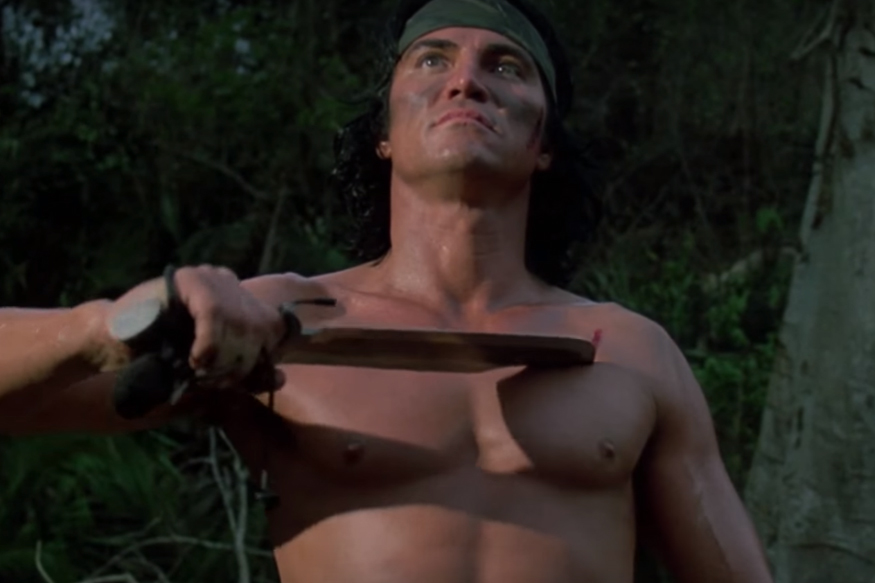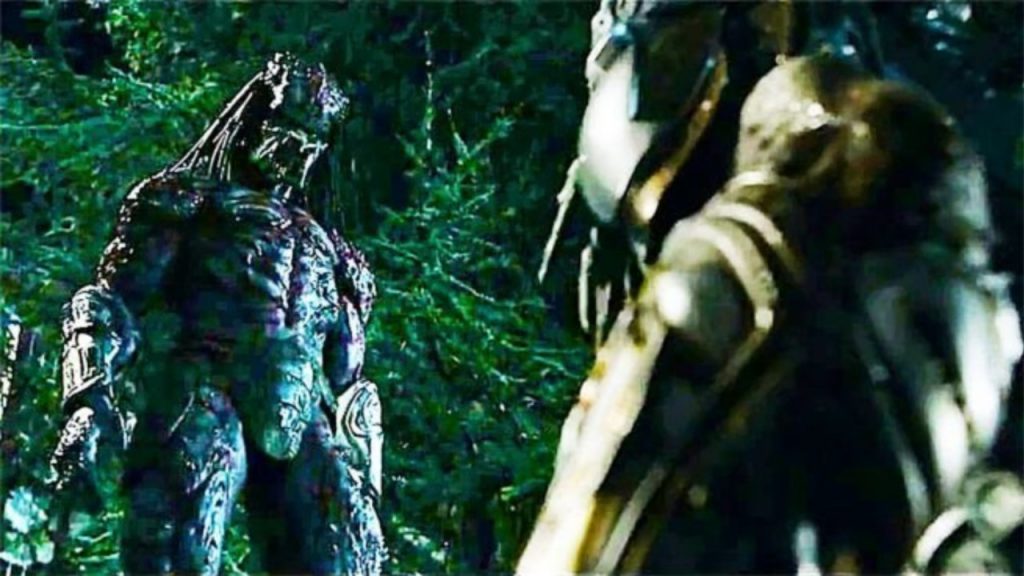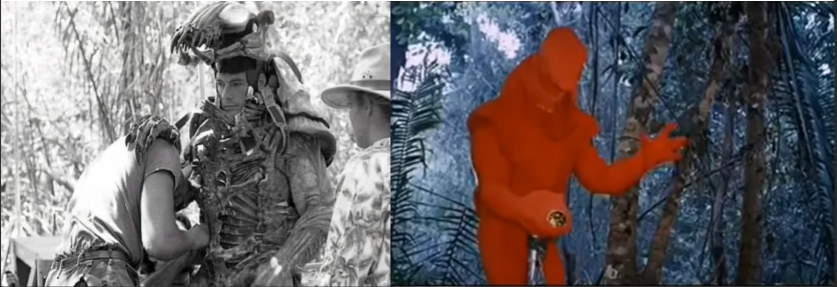The 80s was the best time for action movies.
No, I don’t think that’s a bold or challenging statement. It’s not even really a personal opinion, it’s just a known and accepted assertion among those of us with any understanding of the genre. The 90s was pretty good, but THIS is the era that brought us the franchises of Rambo, Terminator, Alien, Die Hard, and Lethal Weapon, and that’s just to name a few.
The decade also gave us Predator, a movie so remarkable that it stands out even among its peers. A favourite of action aficionados, and possibly even better than marriage, Predator is one of the best action movies, not just of the 80s, but of all time.
Now, this would normally be the moment where I’d insert a short summary of the movie plot, including the names of the stars and director. But I’m not going to do that here, because this is PREDATOR, the cinematic magnum opus in which beefy men do battle in the jungle with a huge, dreadlocked alien! Honestly, if you haven’t seen Predator, what have you been DOING with your life?
You might have guessed by now that I love this movie, and in that I am far from alone. Something about Predator just resonates so well with viewers. So much so that in the years since the movie was released it has gained legendary status, and the alien itself has become a cultural icon. For decades now Hollywood has been trying to recapture the magic of the first movie, beginning with the straight sequel Predator 2, then pitting the Predator against Xenomorphs in the spin-off franchise Alien vs Predator, before trying again in 2010 with straight sequel/franchise reboot Predators. The latest attempt to bring the franchise back to our screens has landed in the form of The Predator, written by legendary action writer, and star of the original movie, Shane Black.
Reception to the previous Predator sequels/spin-offs has not been great, and so far reviews of The Predator have been somewhat mixed. Has Shane Black been able to break the streak and bring the Predator back to cinematic glory? Well, I haven’t seen The Predator yet, but I’m inclined to be skeptical.
Why do I say this? Well a consistent feature of all the best 80s action movies is the concept of ‘macho’, and Predator is no exception. Muscle-bound hunks rampage through the jungle, toting big guns and blowing up pretty much everything, all while throwing quips and quotable lines like oral grenades. Predator walks the line between brainless action, taut horror, and the PTSD war movie aesthetic reminiscent of First Blood and Apocalypse Now. The problem is that things have changed since the first movie, especially in Hollywood. The concept of macho as an expression of masculinity is now so unfashionable that it’s literally deemed to be toxic. The idea of trophy hunting is now seen as so abhorrent that those that partake in it are hugely vilified. The action genre is no longer dumb popcorn entertainment, it has ideology, it may be sexist/racist, it may be harmful. Macho men with muscles no longer rule the Hollywood action scene. In fact, they have been reduced to a joke, an embarrassing cliché now unacceptable outside the realms of mocking, nostalgia-driven pastiches like The Expendables. While former pro-wrestlers like Dwayne Johnson can still make the jump to Hollywood, they can only do so if they glue their tongue to the inside of their cheek.
With all of this in mind, how do you take something as rooted in the machismo as Predator and update it for the modern audience?
The difference between the way that macho masculinity and trophy hunting is viewed in modern times is incredibly clear when comparing the portrayal of these concepts in Predator with one of the more modern takes on the Predator franchise, such as Predators.
The men in Predator may be trigger-happy muscleheads, but it is made clear from the outset that they are professional soldiers, and a rescue team to boot. They may spit tobacco phlegm all over your shoes and tell a mean pussy joke, but it’s well communicated to the viewer that despite the dick measuring bravado these are good men, and a closely bonded unit. Much has been made of the homoerotic undercurrents within relationships between the characters, particularly Mac and Blaine, with some going as far as to interpret Predator as a commentary on homosexuality and the threat of AIDS. Make of that what you will, but what is important here is that the characters are portrayed sympathetically. The only woman in the story, captured guerrilla fighter Anna, spends the majority of the movie as an unarmed prisoner. Her predicament leads Dutch to deduce that the Predator only kills people if they are armed, since the alien has multiple opportunities to kill Anna and does not. The conclusion that the Predator will only attack those who are armed, and therefore capable of defending themselves, became a major part of the franchise lore. It suggests that the Predator has rules for the game, a code of conduct that protects the weak/innocent and ensures that the hunters only make kills that are considered to be honourable. This was reiterated multiple times in Predator 2, with the Predator checking that the gun a boy was brandishing was real before attacking, and later refusing to kill the armed detective Leona Cantrell after discovering that she was pregnant.
Compare this with the character choices made in Predators, released in 2010. In this movie the men are not soldiers, they are killers. The group is a horrifying mix of murderers, mercenaries, organised crime enforcers, warlords, and Yakuza. They are all strangers, and they fight each other as much as they fight to survive. The masculinity on display here is a twisted shadow of the macho, patriotic jingoism of the first Predator. These men are not defending their country, or doing anything as laudable as being part of a rescue team. These are men that kill for money, for power, and even for pleasure. Again there is only one woman, Isabelle, an Israeli Defense Forces Sniper. She is the only character that is presented as a soldier more than a killer, and given any kind of sympathetic portrayal.
As for the alien, Predators contains only one example of the honourable hunter of the first and second movies, and he spends most of the movie weak and immobilised. The primary antagonists are three Super Predators, who appear to be part of a Predator sub-species. They are larger and stronger than the standard Predator, and the two sub-sections appear to be engaged in a blood feud. The most important difference is the removal of the hunter code of conduct, the Super Predators have no issue with killing those that are unarmed or unable to defend themselves. They also use traps and alien hunting dogs to injure or panic their prey before moving in for the kill, since they value the number and efficiency of the kills more than any perceived nobility in the hunt. The association of masculinity with unrestrained violence and ruthlessness, and the removal of the concept of the honourable big game hunter who only pits his skills against those who have a chance of besting him, are very clear choices that sit in complete opposition to the original franchise concepts. This suggests that while Hollywood was still very much ok with the Predator, the core ideas that made the original movie so good had been rendered obsolete.
There’s a bitter irony in Predator being banished to the macho black hole of shame, and doing so rather misses much of the point. While the movie appears to revel in all the glorious 80s action tropes, the actual intention of director John McTiernan was to satirise and critique the genre. As a concept, Predator is designed to be a great action movie that simultaneously pokes fun at action movies. The muscular actors, the explosive stunts, even the gigantic weapons like Ol’ Painless (a 7.62mm M134 Minigun designed to be mounted on a helicopter) were chosen by McTiernan to make everything in Predator grossly exaggerated, while being just short of outright parody.
Predator is a movie that consists of layers of conflict, with every layer connecting not only with each other, but with a theme that subverts the standard action movie formula. Though the characters are military heroes, they conflict with their superiors by refusing missions that they feel ethically uncomfortable with. This is referenced near the beginning when Dillon asks Dutch why he passed on Libya. The team conflict with each other, identifying Dillon as an interloper and treating him with disdain. The men are then built up as rescuers, conflicting with the guerrillas as they attempt to save the hostages. The big action scene in which the commandos take out the camp was shot by stunt coordinator/second-unit director Craig R. Baxley, who had been asked to ramp things up beforehand. Director John McTiernan wasn’t happy, feeling like the scene was overblown and had too much of a war movie aesthetic, but he was convinced to leave it in. Then the pro-America flag waving is intentionally undermined by the reveal that the premise of the operation was a lie. Dutch’s team were not sent in as heroic saviours of lives, but as expendable operatives on a dirty, covert mission to recover intelligence.
The characters also conflict with their surroundings, the thick jungle foliage giving a feeling of imprisonment and isolation. This increases the tension as the commandos, who defeated the camp of insurgents with barely a scratch between them, are easily stalked and picked off one by one by the Predator. Indeed, the cloaking device of the alien makes it seem as if it is the jungle itself that hunts them. Members of the group succumb to terror and exhaustion, increasingly making bad choices.
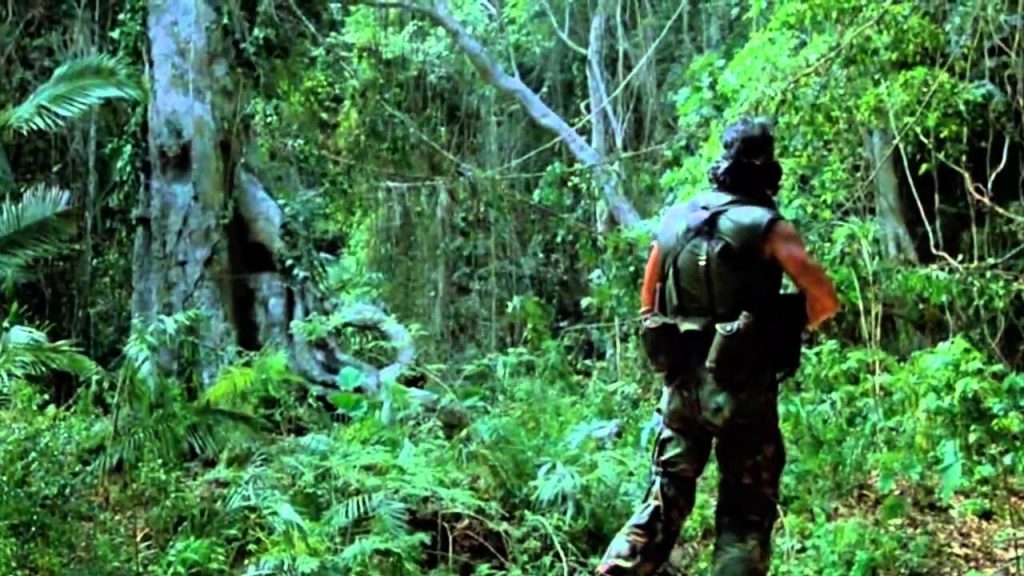 Then we come to the famously macho scene in which the commandos randomly fire into the jungle, all of which is intended to be a statement AGAINST guns, and in particular the worship of guns within the action genre. The idea was that these men had spent the entire movie so far relying on their big guns and their…well…big guns to solve their problems. However, against the Predator? The guns and macho posturing are completely useless. As John McTiernan puts it “I had a feeling people had a perverse fascination with guns firing. So I created this sequence where they take all of their guns and they blaze away and flatten the jungle. I was taking the piss, as the Australians say. The whole point is the impotence of all of the guns. It was exactly the opposite of what I believed I was being hired to sell.” It’s bad enough that the guns are mostly ineffective against the Predator, but the fact that the very act of carrying them makes the men viable targets for the alien is another huge chunk of irony.
Then we come to the famously macho scene in which the commandos randomly fire into the jungle, all of which is intended to be a statement AGAINST guns, and in particular the worship of guns within the action genre. The idea was that these men had spent the entire movie so far relying on their big guns and their…well…big guns to solve their problems. However, against the Predator? The guns and macho posturing are completely useless. As John McTiernan puts it “I had a feeling people had a perverse fascination with guns firing. So I created this sequence where they take all of their guns and they blaze away and flatten the jungle. I was taking the piss, as the Australians say. The whole point is the impotence of all of the guns. It was exactly the opposite of what I believed I was being hired to sell.” It’s bad enough that the guns are mostly ineffective against the Predator, but the fact that the very act of carrying them makes the men viable targets for the alien is another huge chunk of irony.
It is these multiple layers of strife that allow the Predator to remain in the background for the first act of the movie, not fully revealing itself until well into the second act. Hell, they could have removed the Predator entirely and just made a movie about commandos in the jungle convinced that they were being hunted, when in truth they were just going bonkers and succumbing to the perfectly ordinary dangers of such an environment. It would have been just as interesting, though perhaps not as fun.
The biggest and most important conflicts come at the end of the movie, as Dutch battles not only against the Predator, but against himself and his own doubts that he can win. The macho 80s hero is not usually afforded the luxury of self-doubt, their almost superhuman level of macho confidence is a huge part of their appeal (think Arnie in Commando for a good example) However, in Predator, there are several moments where Dutch really seems to believe he’s finished. As he lies injured and screaming for Anna to “GET TO DA CHOPPA!” and later, as he crawls through the wet mud while the Predator tracks him through the water, it’s clear that Dutch expects to die.
While Predator may be dismissed as just another 80s macho movie its ultimate appeal lies in how truly subversive the film is. This is ultimately highlighted in the final fight between Dutch and The Predator, because while the movie may seem to have spent the majority of the time glorifying the sweaty macho muscular bodies of its characters, the Predator is defeated by Dutch using his BRAIN. He outwits the alien with traps, pitfalls, and tricks to confuse the Predator’s advanced technology, and these are all created from combining the knowledge he has gathered about his enemy with the materials available in the environment. The Predator is defeated, blowing up itself and the technology it wields in a final act of defiance. Dutch is left alone in the ruin, and spends the helicopter ride home looking unheroic as can be, bloody, caked in filth, and half dead from exhaustion.
Ultimately, the failure of Hollywood to update the Predator franchise comes down to the lack of understanding of what Predator truly is, a critical SATIRE of a macho 80s action movie. The fact that Predator is viewed largely without irony does not mean that it has failed to satirise the genre. Far from it, the best kinds of satire are the ones that truly embrace, and even love, what they are poking fun at. The key element is that the criticisms are aimed at making the thing better, not belittling or shaming the thing and those who enjoy it. By shunning the macho, exorcising the irony, and disregarding the original franchise lore, Hollywood is ignoring everything that made Predator truly special. The subtle and edged satire of Predator says far more on the overblown absurdity of the machismo than the blunt banality of The Expendables ever could.
Predator is a remarkable piece of film-making, a perfect storm of action goodness that came about not as a result of any particular plan, but because of circumstance and ingenuity. It was so close to being a disaster, as evidenced by pictures of Jean-Claude Van Damme in the original suit. What anyone hoping to update the franchise needs to realise is that, as an audience, we didn’t just fall in love with the Predator itself. Without the overblown machismo, the layers of meaning, and the satire? The Predator is just another big guy in a monster suit.

